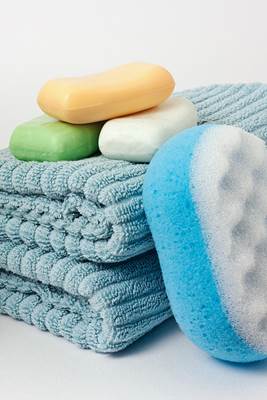 Image Courtesy: Horia Varlan
Image Courtesy: Horia Varlan
Many people believe that germs are something harmful to the human body. However, there are more than 500 different species of microbes that live in our organism and have a protective function – on our skin, in our mouth, in our internal organs, etc. Such micro-organisms protect our body from a lot of harmful agents, not to mention the fact that in the human organism, there are germs that produce vitamins or are involved in the regulation of different hormones.
Our Skin has a Natural ‘Microbial Background’
The natural “microbial background” of our skin is no less important. Our normal micro-flora, which forms a protective layer on our skin, protects us from foreign organisms that can be harmful to our body. Unfortunately, the natural “microbial background” is ruined by using different antibacterial soaps, detergents or disinfectants, which are great when it comes to disinfecting small scratches and wounds, but their continued use can hardly be described as necessary.
The worse news is that some research have shown that living in a sterile environment leads to the emergence of various allergies.
Antibacterial Soaps Violate the Natural ‘Micro-Flora’ of Our Skin
The truth is that our body loses its resistance thanks to prolonged use of antibacterial soaps. This way we literally clear the way for some of the dangerous microbes by sterilizing our skin, which is exactly the reason why many specialists do not recommend the use of antibacterial soaps and disinfectants.
The excessive care for the purity of our body may lead to violation of the natural micro-flora of our skin, which on the other hand is able to provoke different diseases.
Why is the extensive use of antibacterial soaps and detergents considered dangerous?
A significant number of data proves that in most cases, the use of antibacterial soap in a normal household is unnecessary and may rather harm both human health and the environment we live in. The excessive use of antibacterial agents can lead to resistance of the entire organism and reduce its effective natural defense against some pathogenic bacteria such as Escherichia coli (E. Coli) and Salmonella Enterica, for example.
Ban on Antibacterial Detergents Recommended
In 2000, the American Medical Association (AMA) recommended that the Food and Drug Administration (FDA) of the United States of America monitor and even regulate the use of antibacterial detergents in households, as there is no actual evidence that they are useful, but rather contribute to deterioration of the problem by helping the resistance of bacteria to different antibiotics and antibacterial agents.
In 2005, a group of experts who worked for Food and Drug Administration (FDA) of the United States of America reported that antibacterial soaps had proved to be more effective when it comes to preventing different infections among the population than ordinary soaps. Particular attention was given to products with antibacterial properties that contain antibacterial compounds such as triclosan, for example.
The problem, however, is that such ingredients kill not only the pathogenic bacteria but also the more sensitive bacteria, which are rather useful to human organism. When all the sensitive bacteria in an ecosystem are destroyed, the resistant ones can breed undisturbed, which means that they begin dominating the environment.
When should you use antibacterial soaps and other powerful disinfectants?
The use of antibacterial soaps and other powerful disinfectants is needed only when there is someone who is seriously ill or suffers from weakened immunity in your home. The more conventional and natural cleaning products such as regular soap, warm water, alcohol, bleach, etc are quite sufficient in most cases.
Development of the Immune System
Actually, the use of antibacterial agents may damage your child’s immune system rather than keeping them from diseases. Some experts in the field even consider bacteria quite necessary for the development of the immune system in early childhood, which means that your baby should have contact with some germs during their first year in order to develop the antibodies that they will need in order to fight different infections later in life.
Jessica loves to write about cleaning and health. She works as a professional cleaner at http://www.perfectcleaning.org.uk/house-cleaning-clapham-sw4/ and has a lot of experience.
Best Antibacterial Bar Soap says
It is true that antibacterial soap prevent you from skin infection or any type infection. It is best way to cure your infection. For the antibacterial benefit, it contains some essential oils like tea tree oil and eucalyptus oil and hence proves its claim for being an antibacterial soap. 2% of extremely good quality of essential oils are added to the soap.